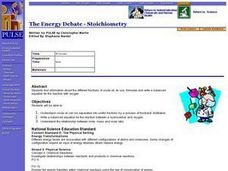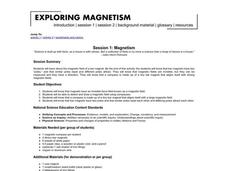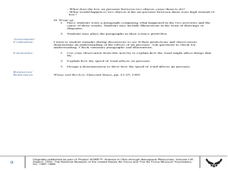Curated OER
Volume and Surface Area: Which Is More?
Students explore the volume and surface area of three dimensional figures. Through the use of video, students discover three dimensional shapes, their uses in real-life applications, and methods used to calculate their volume and surface...
Curated OER
The Dalton Model
In this Dalton worksheet, students read about John Dalton and his contributions to understanding the atom. Students are given sample data for Dalton's experiments and they answer questions about the data in his experiments.
Curated OER
Inside an Atom
In this atom worksheet, students read about the history of the discovery of the atom. Students write a story, poem, song or other creative project in which they shrink to an incredibly small size and are trapped in a carbon atom.
Curated OER
Hydrologic Cycle Scavenger Hunt
Students explore the water cycle using educational resources. In this water cycle instructional activity, students use a global climate DVD to complete a scavenger hunt on the hydrologic (water) cycle.
Curated OER
Beads, Balls, and Beakers
Young scholars analyze the amount of space required to pack round objects. In this geometry instructional activity, students practice using space economically by practicing packing spheres into beakers. They then translate this concept...
Curated OER
Sugar Solutions
Seventh graders study biological systems and how they reach equilibrium. In this system balance lesson students divide into groups and complete an osmosis lab activity.
Curated OER
Tornadoes
Middle schoolers examine the characteristics of a tornado. They practice using new vocabulary and participate in a question and answer session. They use the internet to gather more specific information.
Curated OER
The Energy Debate - Stoichiometry
Students determine crude oil can be separated into useful fractions by a process of fractional distillation. They write a balanced equation for the reaction between a hydrocarbon and oxygen.
Curated OER
Living with Disaster: Mother Nature Rules
Students analyze various types of natural disasters and discover techniques man uses to live with nature and to control nature. They are able to identify ways that man has learned to predict natural disasters; identify ways that man has...
Curated OER
Ecology
In this ecology learning exercise, students read information about ecology and the nine ecology subdivisions and answer comprehension questions. Students answer ten questions in this matching and fill in the blank learning exercise.
Curated OER
Marine Protected Areas (MPA)
Ninth graders explain the purpose of MPA's. In this biology lesson, 9th graders identify MPA's in Southern California. They simulate coastal sampling using candy from two buckets. Students analyze their results and share it with the class.
Curated OER
Electromagnetism
Young scholars explore the generation of magnetic fields from currents in wires and measure the magnetic field directions. They measure magnetic fields in their own environment. They also examine how moving magnetic fields can create...
Curated OER
Magnetism
Students examine the concept of magnetism by doing several activities using magnets and compasses. They explore poles and polar repulsion and attraction.
Michigan Sea Grant
Food Chains and Webs
Starting with a simple food chain, young scientists interpret the difference and interrelatedness between herbivores, carnivores and producers. They answer questions related to cause and effect of food chain disruptions, including the...
Curated OER
Numbers in Art
Students choose a number from one to twelve and tell a number story about it. They listen to the teacher read "Numbers in Art" by Lucy Micklethwait. Students choose three numbers from one to twelve and view works of art while looking for...
Curated OER
Influential Scientists Vocabulary Quiz
In this science vocabulary worksheet, students match the names of 19 science professionals with the definition. Example: Ichthyologist (studies fish).
Curated OER
Blame It On El Nino
Learners understand what the weather phenomenon El Nino is and what causes it. Students recognize how remote sensing technology can detect and predict El Nino. Learners discover how El Nino effects weather conditions throughout the globe...
Curated OER
The Dirt on Worms!
Fourth graders make predictions, observe, collect and record data. They investigate several soil and worm websites. Finally, 4th graders write a letter to The President which defends earthworms by explaining their value to the United...
Curated OER
T-Shirt Chromatography
Students study about chromatography, a process used to separate mixtures. They see that chromatography is used to detect, separate or purify different substances. This nice lesson results in a beautiful t-shirt for each student!
Curated OER
Horns or Antlers-You Decide!
Young scholars study the difference between horns and antlers. They identify animals who have each and draw pictures of these animals. They experience samples of actual horns and antlers.
Curated OER
Welcome to Love Canal
Students engage in a variety of activities that address the ethical issues surrounding the Love Canal case study.
Curated OER
Sleet and Hail Have Their Own Seasons
Second graders explain the definition of hail and sleet. In this precipitation lesson, 2nd graders discuss when hail and sleet fall and the results of hail falling.
Curated OER
Have a Ball with Bernoulli II
Third graders explore the work of Daniel Bernoulli through experiment and background information. In this Bernoulli lesson plan, 3rd graders participate in air pressure experiments. Students record their observations of the effects of...
Curated OER
They Called Him Sequoyah
Students become familiar with George Gist and his life as a Cherokee. In this Cherokee lesson, students research the ways people have communicated in the past and presently. Students recognize that better communication could have...
Other popular searches
- Physical Changes of Matter
- Matter Physical Changes
- Physical Changes in Matter
- Matter Physical Changes
- Matter and Physical Changes

























